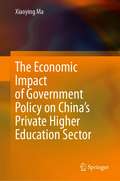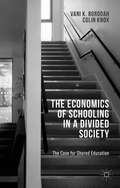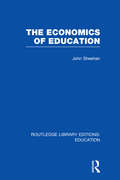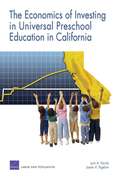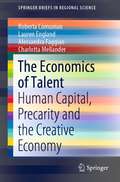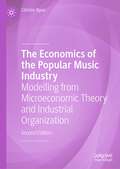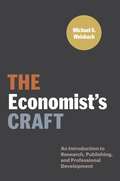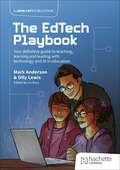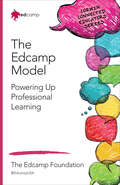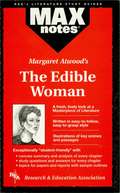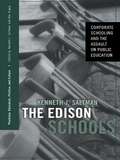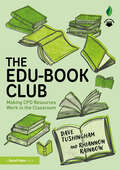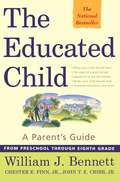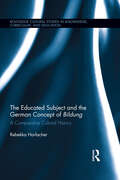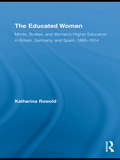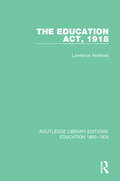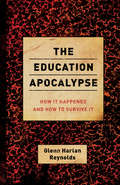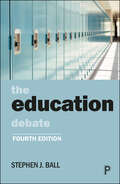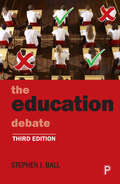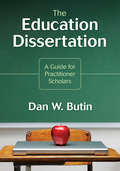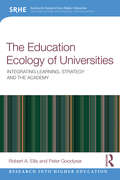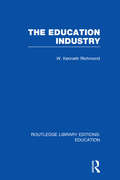- Table View
- List View
The Economic Impact of Government Policy on China’s Private Higher Education Sector
by Xiaoying MaThis book provides an overview of the growth of the private higher education sector in China and in addition provides an analysis of some of the key drivers of this growth and impediments to it. What is new about the book is that it combines the results of a series of interviews with work that is more quantitative in nature. The book is of use to not only those engaged in academic research but also those who more generally wish to know more about an educational sector that is growing in importance. The most obvious factors promoting expansion of this sector have been the growth in per capita incomes, higher levels of participation in secondary school education, the strong growth in demand for graduates and the inability of the public sector to keep pace with demand. All of these factors intermingled with the involvement of government regulation. This regulation, however, is not uniform across all of China given the different provincial government departments of education that are also involved in dealing with private higher education institutions. In particular, this book looks at the way in which the Chinese government’s regulatory framework (both national and provincial) influenced the development of the sector and the way in which it operates, especially the private higher education component of that sector. The analysis undertaken finds that there is a link between regulation and the private higher education sector growth and a link between the funding of the government sector. The more intense regulation was, and the more funds provided to the state sector, the less scope there was for the private sector to expand. Growth of the private sector, therefore, did not just depend upon rising demand for higher education overall, but also to a fair degree of tolerance on the part of government. Much of this work, in subsequent years, has been supported by the further changes that have been undertaken in the Chinese higher education sector. Over the years, the growth of the Chinese higher education sector has stabilised, as has the private segment of this sector.
The Economics Of Schooling In A Divided Society
by Colin Knox Vani K. BorooahCountries that have suffered ethnic or religious conflict and become segregated societies reflect these divisions in education provision for their children. Northern Ireland is a case study in point where a parallel system of schools offers education in Catholic maintained schools and Protestant (de facto) controlled schools. While school segregation is the most obvious manifestation of Northern Ireland's fractured society, there are more important issues of 'educational inequality' with respect to schools and pupils. This book analyses three issues in some detail: segregation, educational performance and inequality in educational outcomes between schools and between pupils from deprived and affluent family backgrounds. Thus far public policies to tackle these issues have been met with limited success. The authors consider an alternative approach, which they term 'shared education', the aim of which is to improve school performance and, in so doing, to dismantle some of the barriers between maintained and controlled schools.
The Economics of Education (Routledge Library Editions: Education)
by John SheehanThis book is a survey of the principal aspects of the economics of education, such as the demand for education as consumption and as an investment, good education and economic growth, education and manpower needs, and the finance of education. In some cases in recent years, economic theory has been applied to educational problems in order to gain an insight into the workings of the educational system. The result has been a certain amount of confusion and distrust among teachers and educationists: confusion because some theoretical aspects are not easily understood and distrust of the economist’s intrusion into educational policy-making. This book overcomes these problems by making minimal demands on prior knowledge of economics and by emphasizing the limitations of economic analysis applied to policy matters.
The Economics of Investing in Universal Preschool Education in California
by Lynn A. Karoly James H. BigelowThere is increased interest in California and other states in providing universal access to publicly funded preschool education. In considering such a program, policymakers and the public focus on the potential benefits and costs of such a program. This study aims to inform such deliberations by conducting an analysis of the economic returns from investing in high-quality preschool education in the state of California.
The Economics of Talent: Human Capital, Precarity and the Creative Economy (SpringerBriefs in Regional Science)
by Alessandra Faggian Roberta Comunian Charlotta Mellander Lauren EnglandTo date, research into urban economics, regional science and economic geography has predominantly focused on the firm and industry as the key units of analysis in order to understand economic development; however, the past few decades have seen a growing interest in the role played by talent in the knowledge economy. This book provides an essential overview of the skills revolution. It presents key milestones of the changes in economic development in the past few decades and explains the motivation behind the rise of talent, as well as its importance for cities and economies. It also offers advice on how to attract and manage talent – a major determinant of competitiveness for countries and regions around the world. In closing, the book explains the underlying theories and provides practical examples for students, researchers and practitioners alike.
The Economics of the Popular Music Industry: Modelling from Microeconomic Theory and Industrial Organization
by Christie ByunThis book uses economic theory to explain how consumers and producers have responded to major changes in the music industry. Byun examines the important role of technology in changing its structure, particularly as new methods of creating and accessing music prove to be a double-edged sword for creators and producers. This second edition includes new information about concert attendance and live performance in the COVID era and what followed, as well as the resultant economic impacts on the industry. Throughout the book, Byun questions how the business of music affects creativity and the extent to which this impacts the creative output of the individual artist. Chapters also address copyright enforcement and online piracy. This is an approachable resource for economists interested in the music industry as well as business and music majors studying the ways in which technology can impact a creative process.
The Economist’s Craft: An Introduction to Research, Publishing, and Professional Development (Skills for Scholars)
by Michael S. WeisbachAn incisive guide that helps up-and-coming economists become successful scholarsThe Economist's Craft introduces graduate students and rising scholars to the essentials of research, writing, and other critical skills for a successful career in economics. Michael Weisbach enables you to become more effective at communicating your ideas, emphasizing the importance of choosing topics that will have a lasting impact. He explains how to write clearly and compellingly, present and publish your findings, navigate the job market, and more.Walking readers through each stage of a research project, Weisbach demonstrates how to develop research around a theme so that the value from a body of work is more than the sum of its individual papers. He discusses how to structure each section of an academic article and describes the steps that follow the completion of an initial draft, from presenting and revising to circulating and eventually publishing. Weisbach reveals how to get the most out of graduate school, how the journal review process works, how universities decide promotions and tenure, and how to manage your career and continue to seek out rewarding new opportunities.A how-to guide for the aspiring economist, The Economist's Craft covers a host of important issues rarely taught in the graduate classroom, providing readers with the tools and insights they need to succeed as professional scholars.
The EdTech Playbook: Your Definitive Guide to Teaching, Learning and Leading with Technology and AI in Education
by Mark Anderson Olly LewisThe EdTech Playbook is your go-to guide to using EdTech in evidence-informed ways to help you work smarter, transform your teaching and enrich students' learning.Whether you're an experienced educator or newly qualified, this book is packed with practical strategies and real-life examples from fellow teachers you can benefit from. Learn about:- expert advice from experienced authors who know what works- powerful case studies showcasing how educators at all levels use technology to make a difference- time-saving tips to reclaim your precious time- how to leverage AI to support your teaching and their learning- workable ideas to bring light into your everyday teaching practice- how to support digital transformation at scale- the importance of online safety and the role of safeguarding and data privacy in EdTech.The EdTech Playbook is your roadmap to increasing not just your knowledge and skills, but also your creativity in how you apply technology in the classroom. Dive in and become the tech-savvy educator you've always dreamed of being!
The EdTech Playbook: Your Definitive Guide to Teaching, Learning and Leading with Technology and AI in Education
by Mark Anderson Olly LewisThe EdTech Playbook is your go-to guide to using EdTech in evidence-informed ways to help you work smarter, transform your teaching and enrich students' learning.Whether you're an experienced educator or newly qualified, this book is packed with practical strategies and real-life examples from fellow teachers you can benefit from. Learn about:- expert advice from experienced authors who know what works- powerful case studies showcasing how educators at all levels use technology to make a difference- time-saving tips to reclaim your precious time- how to leverage AI to support your teaching and their learning- workable ideas to bring light into your everyday teaching practice- how to support digital transformation at scale- the importance of online safety and the role of safeguarding and data privacy in EdTech.The EdTech Playbook is your roadmap to increasing not just your knowledge and skills, but also your creativity in how you apply technology in the classroom. Dive in and become the tech-savvy educator you've always dreamed of being!
The Edcamp Model: Powering Up Professional Learning (Corwin Connected Educators Series)
by Dan Callahan Kristen N. Swanson Hadley J. Ferguson Kevin Jarrett Kim Sivick Christine Miles Michael Ritzius Ann Leaness Mary Beth HertzExciting professional development that works! Discover Edcamp, a model of professional development that’s never one- size-fits-all—and always productive. In Edcamp, “unconference” participants create the agenda and lead the sessions, drawing on their individual expertise, and engage in active collaboration for real results. Afterward, technology keeps the conversation going, building a connected learning environment that lasts. Here you’ll find the tools to run an Edcamp in your school, district, or region and start connecting, including: An overview of the Edcamp model Evidence showing its effectiveness Practical strategies to use right away A dedicated series website
The Edcamp Model: Powering Up Professional Learning (Corwin Connected Educators Series)
by Dan Callahan Kristen N. Swanson Hadley J. Ferguson Kevin Jarrett Kim Sivick Christine Miles Michael Ritzius Ann Leaness Mary Beth HertzExciting professional development that works! Discover Edcamp, a model of professional development that’s never one- size-fits-all—and always productive. In Edcamp, “unconference” participants create the agenda and lead the sessions, drawing on their individual expertise, and engage in active collaboration for real results. Afterward, technology keeps the conversation going, building a connected learning environment that lasts. Here you’ll find the tools to run an Edcamp in your school, district, or region and start connecting, including: An overview of the Edcamp model Evidence showing its effectiveness Practical strategies to use right away A dedicated series website
The Edible Woman (MAXNotes Literature Guides)
by Jeffrey LilburnREA's MAXnotes for Margaret Atwood's The Edible Woman MAXnotes offer a fresh look at masterpieces of literature, presented in a lively and interesting fashion. Written by literary experts who currently teach the subject, MAXnotes will enhance your understanding and enjoyment of the work. MAXnotes are designed to stimulate independent thought about the literary work by raising various issues and thought-provoking ideas and questions. MAXnotes cover the essentials of what one should know about each work, including an overall summary, character lists, an explanation and discussion of the plot, the work's historical context, illustrations to convey the mood of the work, and a biography of the author. Each chapter is individually summarized and analyzed, and has study questions and answers.
The Edison Schools: Corporate Schooling and the Assault on Public Education (Positions: Education, Politics, and Culture)
by Kenneth J. SaltmanThe story of the Edison Schools is a gripping tale of money, kids, and greed. What began in the 1980s as an enterprise to transform public schools quickly became a troubled business battling falling test scores and dismal stock prices. How did the most ambitious for-profit education company in U.S. history lose respect, money, and credibility in such a short time?Revealing how American McEducation went from glory to crisis, The Edison Schools tracks entrepreneur Christopher Whittle's plan to introduce a standardized nationwide curriculum and cut administrative waste. Education specialist Kenneth J. Saltman finds that the critics' predictions came true in Edison schools across the country: Experienced teachers left in droves, students were virtually given answers to standardized tests to drive up scores, and difficult students were "counselored" out.
The Edu-Book Club: Making CPD Resources Work in the Classroom
by Dave Tushingham Rhiannon RainbowEducational books can help teachers engage in quality CPD (Continuing/Continuous Professional Development), but how do we find the time to read the latest literature? And if we have the time, how do we know what to choose or what we should do with what we read? Born from a real-life book club, The Edu-Book Club helps teachers and school leaders to navigate the wealth of evidence-based CPD by bringing together key publications on teaching, assessment, and curriculum. It shows how the ideas and research presented in these publications can be translated into everyday classroom practice, to help teachers and school leaders develop and inform these practices for their own professional and classroom development. Drawing on a diverse range of books and including practical advice on how to set up and run a book club, each book club session covers: The rationale for choosing that title An interview with the author with accompanying visual notes A summary of the key ideas Key takeaways and implications for classroom practice With an accompanying website featuring the video interviews and additional resources, accessible at https://glt-alwayslearning.co.uk/posts/glt-friends-book-club-edu-book-club, this will be a valuable resource for teachers and school leaders at all stages of their careers.
The Educated Child: A Parent's Guide from Preschool Through Eighth Grade
by William J. Bennett John T. E. Cribb Jr. Chester E. Finn Jr.This parent's guide provides a broad coverage of children's education from preschool to the eighth grade. The chapters in this book discuss the skills that are required to develop a child's intellectual capacity and finally suggest ways by which you can improve and further enhance your child's academic performance.
The Educated Subject and the German Concept of Bildung: A Comparative Cultural History (Routledge Cultural Studies in Knowledge, Curriculum, and Education #2)
by Rebekka HorlacherGerman education plays a huge role in the development of education sciences and modern universities internationally. It is influenced by the educational concept of Bildung, which defines Germany ‘s theoretical and curricular ventures. This concept is famously untranslatable into other languages and is often misinterpreted as education, instruction, training, upbringing and other terms which don’t encompass its cultural ambitions. Despite this hurdle, Bildung is now being recognized in current discussions of education issues such as standardization, teaching to the test, evidence-based policy and high stakes testing. This volume clears up the confusion and misunderstandings surrounding Bildung by examining the origins of the concept and how it has been applied throughout history. It paves the way for educators to fully understand and benefit from this model and all it has to offer.
The Educated Woman: Minds, Bodies, and Women's Higher Education in Britain, Germany, and Spain, 1865-1914 (Routledge Research in Gender and History)
by Katharina RowoldThe Educated Woman is a comparative study of the ideas on female nature that informed debates on women’s higher education in the late nineteenth and early twentieth centuries in three western European countries. Exploring the multi-layered roles of science and medicine in constructions of sexual difference in these debates, the book also pays attention to the variety of ways in which contemporary feminists negotiated and reconstituted conceptions of the female mind and its relationship to the body. While recognising similarities, Rowold shows how in each country the higher education debates and the underlying conceptions of women’s nature were shaped by distinct historical contexts.
The Education Act, 1918 (Routledge Library Editions: Education 1800-1926 #1)
by Lawrence AndrewsThis study, first published in 1976, evaluates the important contribution of the Education Act, 1918, to the development of education in England and Wales during the twentieth century. The Act aimed to establish ‘a national system of public education available for all persons capable of profiting thereby’, and in so doing, laid the framework for the subsequent reforms in the field of education. This title will be of interest to students of history and education.
The Education Apocalypse
by Glenn Harlan ReynoldsFor decades, the U.S. invested ever-growing fortunes into its antiquated K-12 education system in exchange for steadily worse outcomes. At the same time, Americans spent more than they could afford on higher education, driven by the kind of cheap credit that fueled the housing crisis. The graduates of these systems were left unprepared for a global economy, unable to find jobs, and on the hook for student loans they could never repay. Economist Herb Stein famously said that something that can't go on forever, won't. In the case of American education, it couldn't-and it didn't.In The Education Apocalypse, Glenn Harlan Reynolds explains how American education as we knew it collapsed - and how we can all benefit from unprecedented power and freedom in the aftermath. From the advent of online education to the rebirth of forgotten alternatives like apprenticeships, Reynolds shows students, parents, and educators how-beyond merely surviving the fallout-they can rethink and rebuild American education from the ground up.
The Education Debate (Policy and Politics in the Twenty-First Century)
by Stephen J. BallEducation policy in England is constantly evolving and becoming increasingly incoherent and it is therefore becoming harder to keep up with, and make sense of, all the changes. This bestselling book looks at the role of the UK as a social laboratory for global education policy. Covering key concepts, it then examines new areas, including: • Global education policy mobility • Edu-business and philanthropy as policy actors • Marketisation of education • Increase in performance gap • Poverty and austerity • Impact of COVID-19 on schools and in education policy • New forms of governance This extensively updated fourth edition by the key author in the field will maintain its place as the most important text on education policy and makes essential reading for all students and anyone interested in education policy more generally.
The Education Debate (Policy and Politics in the Twenty-First Century)
by Stephen J. BallEducation policy in England is constantly evolving and becoming increasingly incoherent and it is therefore becoming harder to keep up with, and make sense of, all the changes. This bestselling book looks at the role of the UK as a social laboratory for global education policy. Covering key concepts, it then examines new areas, including: • Global education policy mobility • Edu-business and philanthropy as policy actors • Marketisation of education • Increase in performance gap • Poverty and austerity • Impact of COVID-19 on schools and in education policy • New forms of governance This extensively updated fourth edition by the key author in the field will maintain its place as the most important text on education policy and makes essential reading for all students and anyone interested in education policy more generally.
The Education Dissertation: A Guide for Practitioner Scholars
by Dan W. ButinUse these focused guidelines to help you through every stage of the dissertation process! Written for practicing educators pursuing a doctoral degree, this resource provides a step-by-step process for developing and completing an academically rigorous dissertation in a time-efficient manner. Grounded in adult learning theory, this volume: Offers a clear, easy-to-follow approach with concrete goals and workable methods Discusses how practitioner scholars can apply their work experience to the dissertation Includes organizational templates, detailed charts, checklists, a timeline, student examples, and rubrics Provides tips throughout to help students think through situations Covers both quantitative and qualitative research
The Education Ecology of Universities: Integrating Learning, Strategy and the Academy (Research into Higher Education)
by Peter Goodyear Robert A. EllisMany universities around the world are finding that the structures and processes they have put in place to further their educational missions are being tested by rapidly changing circumstances. These changes involve new pedagogies, new course designs, new technologies and updating of the physical campus; reflecting diversifying student needs, growing student numbers, increasing competition and more demanding stakeholder expectations. The Education Ecology of Universities examines these issues, starting with the challenges identified by university leaders who have responsibility for education, digital and campus planning. Sharing an analysis of in-depth interviews with more than 50 leaders, it identifies a range of conceptual and procedural gaps that undermine the full development and alignment of education, digital and campus strategies. The second half of the book provides practical ideas for taking a more holistic – indeed ecological – approach to understanding and improving university learning environments. Setting out a case for a new applied science of educational ecology, this book offers foundational concepts and theoretical perspectives, introducing methods for analysing and evaluating teaching and learning ecosystems. It will be of interest to anyone who wants better ways of understanding how local systems function and can be improved. It is a must-read text for all leaders and researchers in education, and indeed for anyone concerned with the future of higher education.
The Education Gospel: The Economic Power of Schooling
by W. Norton Grubb Marvin LazersonIn this hard-hitting history of "the gospel of education," W. Norton Grubb and Marvin Lazerson reveal the allure, and the fallacy, of the longstanding American faith that more schooling for more people is the remedy for all our social and economic problems--and that the central purpose of education is workplace preparation. But do increasing levels of education accurately represent the demands of today's jobs? Grubb and Lazerson argue that the abilities developed in schools and universities and the competencies required in work are often mismatched--since many Americans are under-educated for serious work while at least a third are over-educated for the jobs they hold. The ongoing race for personal advancement and the focus on worker preparation have squeezed out civic education and learning for its own sake. Paradoxically, the focus on schooling as a mechanism of equity has reinforced social inequality. The challenge now, the authors show, is to create environments for learning that incorporate both economic and civic goals, and to prevent the further descent of education into a preoccupation with narrow work skills and empty credentials.
The Education Industry (Routledge Library Editions: Education)
by W Kenneth RichmondIn one sense, education was always a service industry. This book examines the quality as well as the quantity of contemporary education as it answers the following questions: Are we getting value for money? What makes a good teacher? What sort of education do we want? In the UK in the twentieth century education grew while national income did not. Britain devoted more of its resources to education than any other European nation and yet the UK had the largest proportion of children leaving school at 15 and spent more on each university place than the USA. The author argues that far too little attention was paid to cost-effectiveness analysis and planning. He examines Swedish and American examples and concludes that we must seek and employ the common features of modern management – network analysis, operational research and organizational theory. He also argues that traditional education has to come to terms with the mounting pressures of new curricula and new media.
